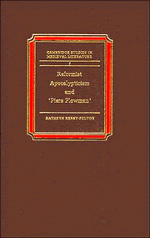Book contents
- Frontmatter
- Contents
- Acknowledgments
- List of abbreviations
- 1 Introduction
- 2 The visionary prophecy of Hildegard of Bingen in relation to Piers Plowman
- 3 Piers Plowman and the medieval visionary tradition
- 4 Leaven of malice: false apostles in the anti-mendicant apocalypticism of later medieval England
- 5 Leaven of hope: new leadership and Joachite apocalypticism
- 6 Conclusions
- Notes
- Select bibliography
- General index
- Index of biblical citations
- Index of manuscripts
1 - Introduction
Published online by Cambridge University Press: 15 October 2009
- Frontmatter
- Contents
- Acknowledgments
- List of abbreviations
- 1 Introduction
- 2 The visionary prophecy of Hildegard of Bingen in relation to Piers Plowman
- 3 Piers Plowman and the medieval visionary tradition
- 4 Leaven of malice: false apostles in the anti-mendicant apocalypticism of later medieval England
- 5 Leaven of hope: new leadership and Joachite apocalypticism
- 6 Conclusions
- Notes
- Select bibliography
- General index
- Index of biblical citations
- Index of manuscripts
Summary
The Prophets Isaiah and Ezekiel dined with me, and I asked them how they dared so roundly to assert that God spake to them; and whether they did not think at the time that they would be misunderstood, & so be the cause of imposition.
Isaiah answer'd: “I saw no God, nor heard any, in a finite organical perception; but my senses discover'd the infinite in every thing, and as I was then perswaded, & remain confirm'd, that the voice of honest indignation is the voice of God, I cared not for the consequences but wrote.”
William Blake's perceptive characterization of the prophetic impetus as the “voice of honest indignation” is perhaps the most apt definition one could find for this peculiar form of religious inspiration. All the medieval prophets and visionaries considered in this study were persuaded that the voice of their own honest indignation was the voice of God and that divine indignation would soon spill over into apocalyptic wrath if this voice continued to be ignored. A comparison between such writers and Langland is not invalidated, I believe, by the fact that Langland was less explicit and perhaps a little more uncertain about his prophetic vocation than they were. That all such prophets were plagued by self-doubt at some point is obvious (it is not by chance that even William Blake, the most boldspirited prophetic writer in the canon of English literature, placed himself as the questioner in the above exchange: “and I asked them how they dared so roundly to assert that God spake to them…”). Langland portrays instances in which his right to speak out must be affirmed (XII. 23–38) and in which the worth of his poetic activity is challenged (B. XII. 16–29),
- Type
- Chapter
- Information
- Reformist Apocalypticism and Piers Plowman , pp. 1 - 25Publisher: Cambridge University PressPrint publication year: 1990

